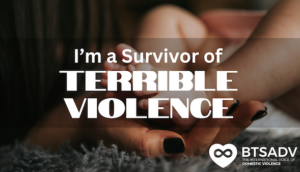Submitted by: *Eliza, Survivor
Many people falsely believe that drug and alcohol abuse and mental health issues are key underlying causes of domestic violence. Rather, these are contributory factors that have been shown to increase the frequency and severity of abuse experienced by the victim. Differences in how control, awareness, and choice present in the dynamics of domestic violence versus substance abuse or mental health issues require an ability to recognize that an abuser is not controlled by violence, but rather the controller of how it is used.
Early in her relationship, Eliza noticed that her abuser’s excessive consumption of alcohol contributed toward the anger he had directed at her. Initially, however, she blamed it on drinking and PTSD and ignored red flags as they cropped up. After she voiced concerns that he had driven home while intoxicated and told him that she was going to take her daughter to her mother’s house, he assaulted her. Find out what motivated her to fight back.
Eliza was with her abuser for five years. When they were dating, he seemed perfect. He gave her gifts, showed her love, and was always there whenever she needed him. The only time he became angry was when he was drinking, so she ignored the problems and all the signs that something could be wrong. Eliza wanted him to be everything, so his alcoholism was a minor issue for her at first.
She mostly remembers him yelling and screaming. There were a few occasions where he pulled a towel rack off the wall or punched the walls, but he never did anything that physically hurt her. Eliza wrote it off as being the PTSD he suffered from as a result of serving in the Army.
Not long before Eliza’s daughter turned three, he had gotten bored with his day-to-day life. He was between semesters at school and did not have a job. The only thing he had to do was watch their daughter. Boredom made him drink more, and he would have two or three drinks before Eliza got home from work at night. She was afraid every night that he was drinking and tried to tell him how she felt about his issues. He only told her that it was not his fault; it was hers. According to him, Eliza caused him to drink and any problems related to that were her doing.
One September night, he got drunk and drove home. Eliza was upset, but she tried to understand where he was coming from. In response to her concerns, he told her that it was her fault and that she should get her OCD under control before lecturing him about his problems. Eliza told him that she did not think the environment was a healthy one for their daughter and decided that she and her daughter were going to her parents for the night so she could think. That was not what he wanted to hear.
He grabbed Eliza by the ponytail and threw her across the kitchen. She was thrown hard enough that her head dented the trashcan as she hit it. He started punching her in the back, so Eliza turned around to keep him from hitting her and causing a severe spinal injury. He tried to strangle her, but she managed to free herself from his grip.
Once she got away, Eliza tried to call the police, but he took the phone out of her hand, threw it, and continued to punch her. She slid under him and got to the knife drawer, where she managed to find something to defend herself. The entire time he attacked her, Eliza screamed for help, but no one seemed to hear her screams. Eliza managed to poke at him a few times with the knife, but in the end, he only stopped assaulting her because he got tired.
“I was able to move him away from me and called the police. That night, I left and didn’t turn back. I knew I had to be there for my daughter. If I hadn’t fought as hard as I did, my daughter would be without a mother. I couldn’t give up.”
*Name(s) have been changed – and in some cases omitted – to protect the identity of the survivor and others affected by the abuse.
**If you or someone you know is in an abusive relationship, there is help. You can visit the Break the Silence website at www.breakthesilencedv.org, chat with one of our helpline advocates at 855-287-1777, or send a private message through our Facebook page. For crisis services, you can contact the National Domestic Violence Hotline at 800-799-7233.
========
What’s YOUR Raw Truth?
Sharing our stories can be incredibly empowering while also helping others connect with survivors who have similar experiences.
If you are inspired to share your story with us, submit here. You can choose to remain anonymous.
Our programs are possible because of our amazing community of supporters. If you’d like to make a financial gift to support our services, please visit our donation page.


